- Home
- W. Bruce Cameron
The Dog Master: A Novel of the First Dog Page 3
The Dog Master: A Novel of the First Dog Read online
Page 3
“I have heard of how a pack of wolves kill a man. How he will scream while they tear the flesh from his body.”
There was a silence. The wolf licked her lips, tasting reindeer on them.
“I cannot let that happen to me. And I know if I tried to take your pups from you now, you would fight me with all your remaining strength.
“I do not understand why you are here. I cannot really even comprehend why I am here. And I do not know what I am going to do.”
THREE
Year One
His name was Silex. He was of the Wolf People, the Wolfen, and had been chosen to pay tribute to the wolves. He was seeking the pack that his tribe had been giving offerings to for as long as anyone could remember, but he did not find those wolves—instead, he was tracking three young wolves who were new to him, juveniles he had only been able to glimpse at a great distance. He was following them because they were younger and, he hoped, less dangerous than full-grown adults. The friendly wolf pack allowed itself to be approached and given meat, but that did not mean they would not kill a man if they had the chance.
He was afraid. He was only sixteen years old and had never been asked to do this before. The duty of providing food to the wolves normally fell to Silex’s father. Silex’s father led the Wolfen, but he had stumbled in some rocks and broken his ankle so severely a bone had pierced the skin. Now the wound festered and was hot to the touch, so Silex had been pressed into service.
The young wolves’ trail was not difficult to follow, though he still had a sense of being far away from them. There was a path along the stream, here, the ground moist and imprinted with both claw and hoof. To the south, downstream, a settlement of humans who called themselves the Kindred spent their summers among some small caves. Between the stream and the wide cold river to the east was Kindred territory. The other side of the river was where the Wolfen roamed. The land this far north, though, belonged to no tribe. These were the northern wilds.
He carried a spear in case he encountered any threat, human or otherwise, and he also carried the front quarter of a reindeer, awkwardly tied in a sling fashioned from strips of hide. The food was the tribute. It was heavy and the excitement Silex had felt when his people solemnly bade him farewell with it had evolved into something like resentment. He was Wolfen, so he ran wherever he went, but his gait was awkward with the tribute bouncing on his hip.
The stream turned away from the path after a time, clinging to a jumble of large rocks to the right. On the left a sunny, grassy area shimmered in the summer sun. Silex felt uneasy as he passed the pleasant, safe-looking area, a defensible space where, had he been hunting, he might have stopped to camp for the night. Where were the wolves taking him?
* * *
It was the first time the three juveniles had left the main pack to hunt on their own. Their enthusiasm felt as if it were bursting from the earth into the pads of their feet, their gait gloriously unrestrained as they followed their noses toward the succulent presence of a herd gathered somewhere up ahead.
The scent had grown no stronger for some time and the female suddenly slowed, her instincts telling her that their jubilance had cost them too much energy on this hunt.
The summer had been good to them thus far. The juveniles had known hunger but not starvation, which was why they had the reserves to keep this pace over the miles. Yet the older wolves would never pursue such a faint trace at such speed for so long. They knew better.
The other two wolves faltered when the female fell back. Though they were both males, she was taller than either of them by a head, as well as stockier through the chest and extraordinarily powerful in her haunches. They looked to her for leadership when they played together, and had torn off away from the pack on this great adventure only because she had done so. Their tongues lolling, they circled her, sniffing, unsure.
The big female lifted her nose to the wind. Now that she was no longer racing headlong through the grasses, new smells came to her, clean and cruel, unknown yet imprinted into her instincts, her species’ memory. She would someday experience all of these sensations and know them as winter, but for now, with the summer flowers waving in the slight breeze, they were abrupt and unfamiliar.
She set out in the direction of the cool flowing air, with its promise of something new, because she was a large wolf, accustomed to being unafraid. The males fell in behind her in submissive single file, finding their places in line according to the pack order they had decided amongst themselves for the purpose of the day’s hunt.
After a time, the soil changed. The few trees vanished and the grass gave way to sparse, coarse ground cover. The earth squished beneath their pads, and where the landscape dipped into depressions here and there, soupy, dark water lay stagnant, the air above boiling with black insects. Then there was a clear, cold brook, and then another. The wolves drank from these slender streams, invigorated.
This was land unlike any the large she-wolf had ever seen before, and she found herself lured irresistibly forward. When a scent traveled past like a wave of heat the wolves stiffened in unison. Elk, up ahead.
She couldn’t help herself: she ran, joy coursing through her veins. Her male companions caught her enthusiasm. They came over a rise and hit the elk herd in a straight line but immediately were disarrayed, made ineffective by their inexperience. There were far too many animals to have a sense of the herd as anything but large. Confused by the elks’ sudden, chaotic scramble and wary of the enormous antlers of the bulls, the wolves found themselves with no clear target. Frustrated, they milled in confusion, snapping at haunches and dancing back from one bull who was charging them with deadly determination, his rack lowered and slashing.
And then the large she-wolf heard the plaintive bleat of a calf that had been separated from the others, and she turned and sprinted in the direction of the sound. The calf bolted and the chase was on, but the wolves were fatigued and ineffectual in their initial charge and thus were forced to pursue fruitlessly, unable to organize a way to cut off the elk calf as she fled.
Nothing in the short lives of the young wolves prepared them for this pursuit, because without warning the earth beneath their feet turned white and slick. Though it was summer, a huge tongue of ice was imperceptibly grinding its way over ground, and the wolves were unsure what to make of it.
The young elk, in flight for its life, was heedless of the abrupt change in footing. She smelled water ahead and her instincts told her swimming would keep her safe. She rushed on blindly, registering but not caring that the ice was sloping forward, that up ahead the world seemed to impossibly end on a near horizon. By the time she realized she’d been betrayed by geography and that the glacier on which she was running was plunging off a rock shelf high above the ground, she was too far down the slick slope to do anything but fall, her legs splayed out and useless.
The wolves watched her vanish over the glacier’s edge without comprehension. None of them, though, wanted to venture down the steep ice to find out what had happened. They stopped, panting, nuzzling each other for reassurance.
Eventually they raised their snouts, picking up a new scent. Meat, plus a living animal of some kind. They turned to follow their noses.
As for their prey: the elk landed with cruel impact on some rocks midway toward the base of the cliff, breaking her spine, but the spray of intensely cold water from the glacier numbed her, and the pain didn’t register as fully as it would have otherwise. If anything, she felt relief—she had evaded the wolves. Now she was in landscape more alien than anything she’d ever encountered, slippery white ice coating everything, a constant rain of meltwater pelting her. Immobilized, peering without grasp at the frozen sheet, she was surprised to see, staring blankly back, another elk, an older female, shallowly buried beneath a layer of ice. Other animals had come this way before, perhaps for the same reason, and had fallen the same way.
A herd animal, the elk drew comfort from the presence of another. The pain had faded, the wolves we
re gone, and she felt sleepy and warm. In a way, she had never known such peace.
* * *
Silex gasped. After so many days of tracking them, the three wolves were suddenly on the trail in front of him, less than fifty paces away.
Breathing raggedly, his mouth dry, he began fumbling with the sling tying the deer meat around his shoulders. The wolves trotted forward, their advance casual, their looks sly. This animal did not look dangerous, and it was alone. And the juveniles detected something else—the tantalizing odor of blood and meat—this, and their inexperience, led them to be incautious.
They weren’t experienced enough to encircle, to outflank. Instead they bunched together on the path, as if they were meeting other wolves instead of prey. When they were less than a dozen paces away, they stopped, their boldness evaporating as they warily eyed the spear pointing at them.
“It has been a good year. You have led us to good hunting,” Silex greeted, his voice quavering. “Soon the summer will withdraw and you will lead us through the snows to where the herds winter. We thank you.”
The males had no reaction to his voice—they sniffed and paced and drew ever closer, working up their nerve to attack. They were both wary and eager, enticed by the smell of the blood hammering through the human’s veins. Silex wanted to drop the meat and run, but it was important, now, to stand his ground. It was not a tribute if he fled.
“Please,” he whispered. He pictured the wolves setting upon him, tearing him open with their teeth, and he nearly could not breathe.
When Silex glanced at the enormous female he was shocked to see her staring him full in the face. No wolf ever did that—their glances were always furtive and clever, never telegraphing their interest.
She was by far the biggest wolf he had ever seen. She was mostly grey, black, and white, but on her forehead was a white mark that looked remarkably like a handprint of a man.
Still staring, the she-wolf took several steps forward, her nose twitching. Silex realized it was to this wolf that he should offer tribute. Could he kneel down and present the gift with humility? No, he was not that brave, so he gripped the foreleg and swung it, tossing it half the distance to the female.
The males shied back at the sudden movement, but the female simply regarded the offering calmly as it dropped to earth in front of her, as if she had been expecting it. She bent to feed, but not before giving Silex one last, contemplative look.
Silex backed away slowly, but the wolves were ignoring him now, content to tear into the reindeer meat. He kept his eyes on them until he was far enough away that they were mere brown specks on the trail, then he turned and headed back down the path in a near run, elated.
He would tell his father about the gigantic female, and the way she had received the tribute. Surely it was a sign that the wolves intended an even closer pact with the Wolfen! The she-wolf had peered into his eyes, knowing him, somehow.
There were those who insisted that the Wolfen were descended from the pack, and many argued that upon death, those who followed the wolves became wolves, while cowards became prey. Silex had not been a coward.
An instinct that told him to look back, a whisper of something alerting him to danger. He turned and his legs went weak.
The wolves were coming.
They were fifty paces behind him and were trotting, not running, adopting the easy lope that would sustain them for miles. The female was in front and the males were filed behind her. Their approach was all the more frightening for its utter silence.
The worst thing he could do was run but he couldn’t help himself. A sob broke from his lips as he pictured how he would now die. No.
When he glanced behind him, of course the wolves were closer. No humans could run as far and fast as the Wolfen, but the Wolfen were not wolves, and the predators behind him would catch him and kill him.
Silex came to the flat grassy turf that lay between the stream bank and the crumbling, boulder-strewn outcropping. He was nearly falling down with terror, so faint with it he wanted to cry for his mother like a child.
He had just been here a short time ago, and the grasses had looked so inviting, the waters so sparkling. Now everything was hazy, his panic nearly blinding him.
Silex stopped running. What did he think he was doing? There was no way to outrun this threat. Gasping for breath, he considered throwing himself in the river, but it was shallow and afforded no escape. He looked upstream and saw that the wolves were closing fast.
All right. It would happen here.
Silex went over to the outcropping, a face of rock thirty feet high. There were no caves, but the soil was strewn with huge rocks and two round boulders shoulder high were close enough together that he had to squeeze between them. Now he had the rocky wall behind him and the two boulders in front of him. The wolves would not be able to surround him—they would have to come through the narrow gap one at a time.
He had his spear, but it was forbidden to use it. Wolves were sacred, never hunted, never killed. If the wolves decided to rush him, he would have to die today.
Perhaps he had been a wolf once before, out of the reach of human memory. Or perhaps now he would join the pack for the first time in his existence. Silex was not sure what he believed about death. His only hope was that the wolves would kill him quickly and that if he did come back, it would be with honor, and not as an elk.
The wolves arrived, tracking him to his hiding place. They milled around, smelling him, whining with their eagerness to feed. The males came right up to the slot between the boulders, emboldened by the chase they’d just won.
Silex set his spear down.
“I offer myself,” he said, his voice almost unrecognizable as it tremored. “I am ready to die.”
FOUR
The wolves could see their prey hiding among the rocks, and they lusted to take it in their jaws. Some blood from the reindeer remained on the human’s skin, and this tantalized them further.
Yet they were unsure how to attack a creature who was barricaded behind boulders. Instinctively, they knew rushing a cornered animal was almost never something they should attempt, though it was a rare animal that was so large and yet so passive as it awaited its fate. Why wasn’t it fleeing, or bleating, or attacking? The male wolves whimpered with frustration.
The large she-wolf stood farther back. She wasn’t as sure as the other juveniles that this was a meal they wanted—there was something very different about this creature. And the reindeer meat had come from him, somehow.
Then her head whipped around, her ears twitching. Downstream, a sound.
“Urs, come on,” a woman’s voice cried, laughing.
The call meant nothing to the wolves, but they all heard it, and now they could smell more humans approaching. They hesitated for a moment, but by the time a young man and woman came around the bend, the wolves were silently gone.
* * *
“This is the place,” the woman announced, coming into Silex’s view. She appeared to be around his age, perhaps sixteen. She had large, pretty eyes, Silex saw, but it was her hair that caught his attention—it was tied in intricate knots, braided the way a leather string was braided to make rope. No Wolfen woman ever wore her hair like that.
The man with her was older by a few years. He was taller than the woman—indeed, he was taller than nearly anyone Silex had ever seen, tall and slender. His beard was black and full, unlike Silex’s, which was tendril-thin.
Silex’s skirt was short to allow him to run and was made of fox fur—like the wolf, his tribe viciously hunted the fox, though unlike wolves they did not tear the creatures apart and leave the carcasses strewn across the ground, but harvested the fur and what little of the tough meat they could get. These two people wore no fur at all—they were both dressed in animal hides tied around their waists, though the tall man’s skirt was longer, descending to midthigh and slit on each side. Where the woman’s upper garment was a simple tunic with slits for her arms and long enough to be tucke
d into the same belt, the man’s similarly cut top was short enough for some of his taut belly to show.
All this Silex took in with a single glance, and then he was crouched down behind the rocks, scarcely breathing. They could not be Kindred; that tribe never ventured this far upstream. But who, then? The Cohort? Silex swallowed. If they were Cohort he was in great danger, but, though they were known to arrogantly wander where they wanted, the Cohort had never been seen in such a small group as two people, and their women never left the river valley.
Silex reached for his spear. If they were Cohort, he would have to kill them.
“And how did you find such a place?” the man, Urs, asked, mock-stern.
“I did not find it, it was already here,” the woman, Calli, teased lightly. She held her face to the sun and beamed.
“Calli Umbra,” Urs chided, addressing her with her formal name. One of the reasons the Kindred knew themselves to be superior to the other creeds was their naming convention. During the third summer of a young one’s life, the oldest woman in the family told a story about the child—the narrative that would guide the children into adulthood. The narrative ended with a legend name, which was a full sentence long, plus a formal appellation suggesting the legend. Thus Calli’s formal name—Calli Umbra—reflected her legend: “Her Thoughts Come from Mists and Shadows.” By giving her this legend, Calli’s grandmother had shrewdly put voice to what everyone suspected, which was that Calli’s brain was complex and calculating.
“You should not have come here. We should not have come here,” Urs scolded. “This is wild territory.”
Urs’s legend told the story of how Urs grew so much more quickly than all the children his age, so that he was as tall as boys several years older, and how he would someday be as large as the great bear. And he was, indeed, tall, with the gangly look of a young man who needed to hang more flesh on his bones. His formal name was Ursus Collosus, but it was of course shortened to Urs, just as Calli was the diminutive of her own formal name.

 Bailey's Story: A Dog's Purpose Novel
Bailey's Story: A Dog's Purpose Novel A Dog's Purpose
A Dog's Purpose Ellie's Story
Ellie's Story A Dog's Way Home
A Dog's Way Home Molly's Story
Molly's Story A Dog's Journey
A Dog's Journey The Dogs of Christmas
The Dogs of Christmas A Dog's Perfect Christmas
A Dog's Perfect Christmas Lily to the Rescue: Lost Little Leopard
Lily to the Rescue: Lost Little Leopard Bella's Story
Bella's Story Lily to the Rescue
Lily to the Rescue Lily to the Rescue: The Not-So-Stinky Skunk
Lily to the Rescue: The Not-So-Stinky Skunk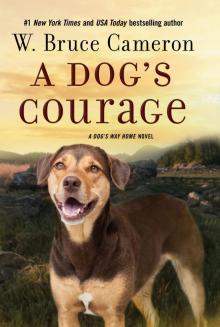 A Dog's Courage--A Dog's Way Home Novel
A Dog's Courage--A Dog's Way Home Novel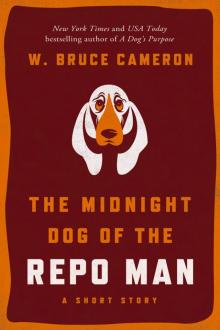 The Midnight Dog of the Repo Man
The Midnight Dog of the Repo Man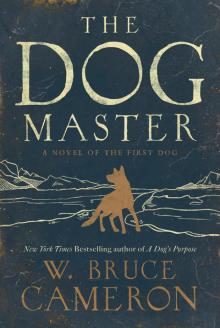 The Dog Master: A Novel of the First Dog
The Dog Master: A Novel of the First Dog Emory's Gift
Emory's Gift Lily to the Rescue: Two Little Piggies
Lily to the Rescue: Two Little Piggies Lily to the Rescue: The Misfit Donkey
Lily to the Rescue: The Misfit Donkey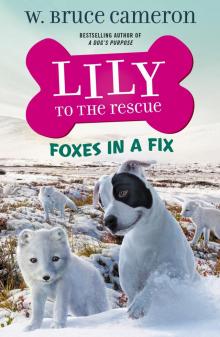 Lily to the Rescue: Foxes in a Fix
Lily to the Rescue: Foxes in a Fix Lily to the Rescue: Dog Dog Goose
Lily to the Rescue: Dog Dog Goose Max's Story
Max's Story A Dog's Purpose Boxed Set
A Dog's Purpose Boxed Set Toby's Story
Toby's Story Repo Madness
Repo Madness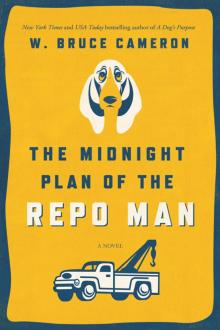 The Midnight Plan of the Repo Man
The Midnight Plan of the Repo Man Shelby's Story
Shelby's Story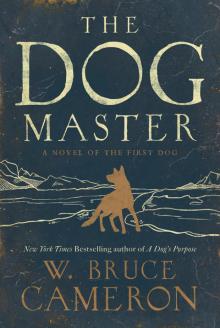 The Dog Master
The Dog Master Bailey's Story
Bailey's Story